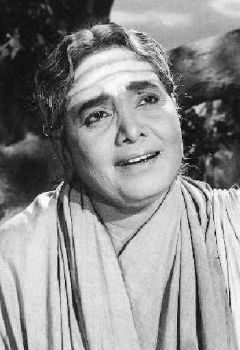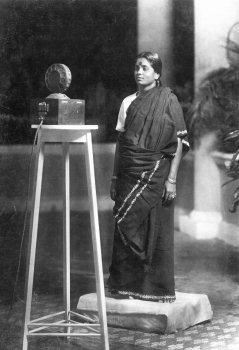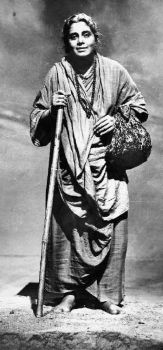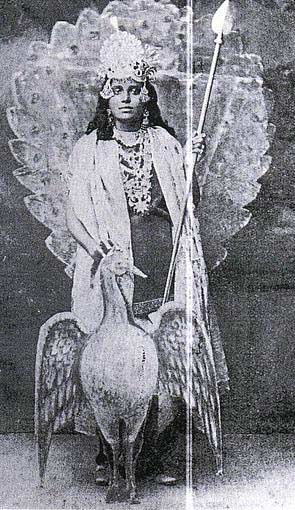
|
|||||||
|
| |||||||
KB Sundarambal and SG Kittappa
There were many of them with the more prominent being, Madras and Southern Mahratta Railway.... Bombay Baroda and Central Indian Railway... Bengal Nagpur Railway... Great Indian Peninsular Railway... and South Indian Railway. These British – owned private companies enjoyed a monopoly until railways were nationalized after India became a free nation on August 15, 1947. The Nizam of Hyderabad who was during his heyday one of the ten richest men of the world had his own railway known as the Nizam State Railway. It had many facilities for passengers like fans in compartments which the British - owned railways did not have except in the first class compartments mostly used to by white skin travelers.
During that period the railways allowed beggars of both sexes to freely move around the lower class compartments asking for alms by singing popular movie song hits of the day. Indeed if a move song which became a popular with this class of beggars it came to be known in Tamil as 'Picchakaran pāttu!' (songs fit for beggars!) One such song ‘ ayyA siru pEN Ezhaiyin pAl…’ " sung by the well-known Madras socialite, singer and actress Tanguturi Suryakumari in the hit film " Adrishtam" (1939) was extremely popular with the begging class in South India.
In Northern India and also in some parts of the South, a Hindi song from the super hit "Kismet", ‘ab tErE sivA kOn mErA’ was extremely popular and formed part of the repertoire of class of beggars moving on trains and also on terra firma. After nationalization it was prohibited as it was considered against Indian culture! Even as a little girl Sundarambal was blessed with the natural feel and flair for music and possessed an excellent voice. Her voice had an astonishingly wide range absolutely fascinating even though it was totally untrained. It was so malleable that she could reach high octaves with seemingly effortless ease which even trained classical Carnatic musicians found it difficult to achieve. Dame Destiny smiled on the little girl when she was discovered while singing and begging on trains by a South Indian Railway official of Trichy, an amateur stage actor, impresario, talent - scout, and play producer, F. G. Natesa Iyer. Natesa Iyer was thrilled to the core by the voice of the poor girl, her singing skills, and feel and fair for music. Without much ado he took her under his wing and introduced her to Tamil theatre. Success came seeking Sundarambal fast thanks to her musical talents. Her stage plays like "Valli Thirumanam", "Pavalakodi", "Harishchandra" and others were great hits during those days. Like others successful stage stars she too traveled beyond the high seas to the neighboring countries. It was while she toured Sri Lanka (then Ceylon) that she met S.G. Kittappa. That strange factor called 'body chemistry' took over and before one could say 'Shencottah Kodumudi!' they fell in love and began to live together as man and wife. It was a case of love on first site! The two were famed as a pair and their biggest hit was "Valli Thirumanam" with Sundarambal as Valli and Kittappa as Lord Muruga but later the two exchanged their roles with much success even during shows in a town or village. This interchange of roles turned out to be a box-office ingredient per se and drew large crowds, who cheered them, every line in their dialogue and song which transported them to the yonder world of joy. Old timers still recall the heated discussions about the exchange of roles and whether Kittappa did better as Muruga or Valli! In some of the rich towns and villages in Chettinad enthusiastic patrons would place bets on who was a better performer. They also threw solid silver coins on stage as tokens of their admiration of the performance. Truly those were the days! The couple became a major draw and came to be treated soon as cult figures. Soon they took part in the Indian Freedom Movement and were ardent patriots and supporters of the Indian National Congress party and idolized great leaders of the Indian Freedom Movement, like Mahatma Gandhi, Pandit Motilal Nehru, Bal Gangadhar Tilak, Desabandhu Chittaranjan Das, Lala Lajpat Rai and others. Like a true patriot Sundarambal always wore khadhi. Sundarambal recorded gramophone discs in praise of the Indian Freedom Movement and national leaders. When Pandit Motilal Nehru passed away she sang 'PaNDita mOtilAl nEruvai …’ in the raga ‘hindustAn kApi’. This disc was a bestseller and is today a collector's item. Indeed many of her gramophone discs became best -sellers and were invariably acquired by every other household in South India. A long song by her refers to the historic and shocking incident of the Jallianwala Bagh Massacre... Lord Birkenhead who was the Secretary of State for India… Mahatma Gandhi and Jawaharlal Nehru. This interesting but now sadly forgotten song was obviously written by the noted theatre person lyricist and patriot Madurai Bhaskara Das. Most of these gramophone discs were on sale for a mere two annas or twelve paise (one eighth of a rupee!) In later years one of her songs with the most famous line Enna…Ennna…Ennna… became famous and the words Enna…Ennna…Ennna… became very popular as an idiom and catchphrase among Tamilians. [The text of this article from Wikepedia is published here under the terms of the GNU Free Documentation License.] |
 Kodumudi Balambal Sundarambal hailed from Kodumudi, a small town near Trichy and was born in 1907 on the wrong side of the tracks in abject poverty. As the legend goes she was left with no option than to resort to begging, singing for alms and copper coins in running trains in and around Trichy which was then the headquarters of the privately owned South Indian Railway, (S.I.R). incorporated in England.That was the period railways in India were in the private sector and were incorporated in England with their stocks and shares quoted on the London Stock Exchange.
Kodumudi Balambal Sundarambal hailed from Kodumudi, a small town near Trichy and was born in 1907 on the wrong side of the tracks in abject poverty. As the legend goes she was left with no option than to resort to begging, singing for alms and copper coins in running trains in and around Trichy which was then the headquarters of the privately owned South Indian Railway, (S.I.R). incorporated in England.That was the period railways in India were in the private sector and were incorporated in England with their stocks and shares quoted on the London Stock Exchange.
